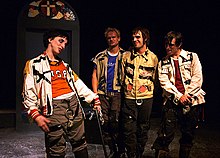Nadsat
Appearance
See also: nadsat
English
[edit]Etymology
[edit]
Borrowed from Russian -надцать (-nadcatʹ, “-teen”). The word was coined by English author Anthony Burgess (1917–1993) in his 1962 dystopian novel A Clockwork Orange.[1]
Pronunciation
[edit]- (Received Pronunciation) IPA(key): /ˈnɑːdsət/
Audio (Southern England): (file) - (General American) IPA(key): /ˈnɑdsət/
- Hyphenation: Nad‧sat
Proper noun
[edit]Nadsat (plural Nadsats)
- The Russian-influenced argot used by the teenage protagonists in Anthony Burgess's novel A Clockwork Orange (1962). [from 1962]
- 1974, Style, volume 8, Fayetteville, Ark.: University of Arkansas, →ISSN, →OCLC, page 475:
- […] Anthony Burgess' A Clockwork Orange, narrated by its teenage punk of a protagonist in an argot called nadsat, which is composed (a psychologist in the book explains) of "odd bits of rhyming slang. A bit of gypsy talk, too. But most of its roots are Slav." […] Despite the dazzling tour de force Burgess brings off, l have not included A Clockwork Orange in my discussion for several reasons. First, nadsat is primarily a parody of the exclusiveness and ephemerality of teenage slang: […]
- 2011, Brigid Maher, “Apples and (Clockwork) Oranges: Intention, Invention and Intervention”, in Recreation and Style: Translating Humorous Literature in Italian and English (Benjamins Translation Library; 90), Amsterdam, Philadelphia, Pa.: John Benjamins Publishing Company, →ISBN, →ISSN, page 121:
- In order to get a full sense of the effect of Burgess's and [Floriana] Bossi's respective Nadsats, it is necessary to examine a complex narrative unit of source and target texts. This will also enable the reader to appreciate the musicality of the original Nadsat.
- 2017, Anna Bogic, “Anthony Burgess in French Translation: Still ‘as Queer as a Clockwork Orange’”, in Marc Jeannin, editor, Anthony Burgess and France, Newcastle upon Tyne: Cambridge Scholars Publishing, →ISBN, pages 219–220:
- Nadsat has been called many things, such as a constructed language, slang, register, and sociolect. Its definition is not single layered since one could argue in favour of all the cases. In the introduction to the 1996 edition [of A Clockwork Orange], Blake Morrison refers to it as a language: […] However, it can be said that Nadsat is also a register since Alex is capable of speaking standard English when he wants to (with his parents at times, for example) […] Furthermore, Nadsat can also be defined as a 'sociolect' as this term stands for any language spoken by a particular social (sub)group and is based on social, cultural, economic and institutional criteria […]. Nadsat is spoken (not written) by Alex, his group of friends and by other teenage subgroups; other characters in the novel (the doctors, government officials) use standard English words without Russian transliterations. Moreover, Nadsat can be viewed as slang since its vocabulary and expressions seem to be of inferior value in comparison with standard English.
Alternative forms
[edit]Translations
[edit]Russian-influenced argot used in A Clockwork Orange (1962)
See also
[edit]References
[edit]- ^ See, for example, Anthony Burgess (1962) chapter 5, in A Clockwork Orange, London: Heinemann, →OCLC; republished as Andrew Biswell, editor, A Clockwork Orange: The Restored Edition, New York, N.Y., London: W. W. Norton & Company, 2012, →ISBN, page 175: “'Very good,' I said. 'Real horrorshow. Written well thou hast, O sir,' And then he looked at me very narrow and said: / 'What?' / 'Oh, that,' I said, 'is what we call nadsat talk. All the teens use that, sir.'”
